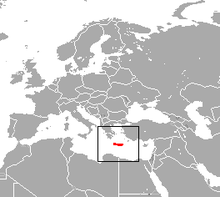The Cretan shrew (Crocidura zimmermanni) is a species of mammal in the family Soricidae. It is endemic to the island of Crete, Greece. Its natural habitat is temperate shrubland, and the animal is threatened by habitat loss. It is found in the mountainous highlands of Crete, having been displaced from lower altitudes by the lesser white-toothed shrew (Crocidura suaveolens).
| Cretan shrew | |
|---|---|
| Scientific classification | |
| Domain: | Eukaryota |
| Kingdom: | Animalia |
| Phylum: | Chordata |
| Class: | Mammalia |
| Order: | Eulipotyphla |
| Family: | Soricidae |
| Genus: | Crocidura |
| Species: | C. zimmermanni
|
| Binomial name | |
| Crocidura zimmermanni Wettstein, 1953
| |

| |
| Cretan shrew range | |
It may be a descendant of the extinct Crocidura kornfeldi, the first Crocidura shrew to colonize Europe, which was distributed throughout central and southern Europe during the Pliocene and Pleistocene.[2] It has remained extant on the island, while contemporaneous Cretan mammals such as mice, dwarf elephants, eight species of Candiacervus deer, and the Cretan otter went extinct.[3]
References
edit- ^ Mitsainas, G.; Vohralík, V.; Kennerley, R. (2019). "Crocidura zimmermanni". IUCN Red List of Threatened Species. 2019: e.T5588A90818329. doi:10.2305/IUCN.UK.2019-1.RLTS.T5588A90818329.en. Retrieved 17 November 2021.
- ^ Rofes, Juan; Cuenca-Bescós, Gloria (2011-01-01). "Evolutionary history and biogeography of the genus Crocidura (Mammalia, Soricidae) in Europe, with emphasis on Crocidura kornfeldi". Mammalian Biology. 76 (1): 64–78. Bibcode:2011MamBi..76...64R. doi:10.1016/j.mambio.2009.12.001. ISSN 1616-5047. Archived from the original on 2019-05-28. Retrieved 2024-12-23.
- ^ Thomas F. Strasser; Sarah C. Murray; Alexandra van der Geer; Christina Kolb; Louis A. Ruprecht Jr (April 2018). "Palaeolithic cave art from Crete, Greece". Journal of Archaeological Science: Reports. 18: 102. Bibcode:2018JArSR..18..100S. doi:10.1016/j.jasrep.2017.12.041.
